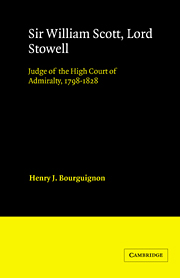Book contents
- Frontmatter
- Contents
- Preface
- List of abbreviations
- 1 Survey of English admiralty jurisdiction: how did it vanish?
- 2 Sir William Scott – a biographical sketch
- 3 The law of the instance court
- 4 Prize law: nationality – a study in detail
- 5 Prize law – a survey
- 6 Scott's judicial philosophy
- 7 Scott's influence
- Appendix: the Stowell notebooks
- Bibliography of primary sources
- Index
- CAMBRIDGE STUDIES IN ENGLISH LEGAL HISTORY
6 - Scott's judicial philosophy
Published online by Cambridge University Press: 29 October 2009
- Frontmatter
- Contents
- Preface
- List of abbreviations
- 1 Survey of English admiralty jurisdiction: how did it vanish?
- 2 Sir William Scott – a biographical sketch
- 3 The law of the instance court
- 4 Prize law: nationality – a study in detail
- 5 Prize law – a survey
- 6 Scott's judicial philosophy
- 7 Scott's influence
- Appendix: the Stowell notebooks
- Bibliography of primary sources
- Index
- CAMBRIDGE STUDIES IN ENGLISH LEGAL HISTORY
Summary
SOURCES
Precedent
Sir William Scott, Lord Stowell, was appointed as admiralty judge in 1798 and continued to serve through the years of the French wars and the Napoleonic wars until he retired in 1828 at the age of eighty-two. Earlier biographies of his work as judge have created the impression that he wrote on a clean slate. The only serious study this century of his admiralty judgments appeared at the time of the First World War. E. S. Roscoe, the registrar of the admiralty court, published a book analyzing Scott's influence on the development of prize law. Roscoe, of course, because of his position as registrar, knew that for more than half a century prior to Scott's years as judge the judgments of the admiralty court had been preserved in manuscript form. He maintained, however, that ‘[T]hese judgments and decisions were no more than formal expressions of the results of the hearing in the first instance and in others of an appeal, and did not, except in a few rare instances, contain the reasoning on which a decision was based.’ Roscoe highlighted this point by insisting that, prior to Scott, no judicial precedents existed in any systematic compilations. ‘Nothing, in fact’, he wrote, ‘in the nature of a series of judicial precedents having the validity of a legal code was to be found – there was a chaotic collection of law, the usefulness of which was slight.’In order that no one could misunderstand him, Roscoe concluded that at the time when Scott became admiralty judge, ‘no body of jurisprudence by which judges and advocates could be guided, or by which an Administration could be assisted in dealing with foreign Powers, was to be found.’
- Type
- Chapter
- Information
- Sir William Scott, Lord StowellJudge of the High Court of Admiralty, 1798–1828, pp. 243 - 279Publisher: Cambridge University PressPrint publication year: 1987



